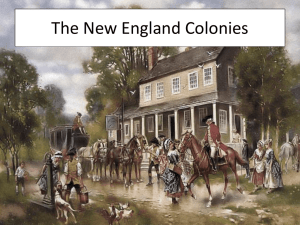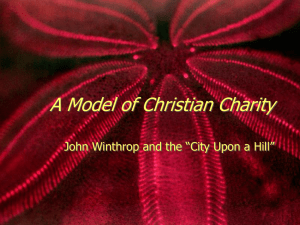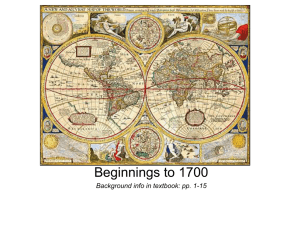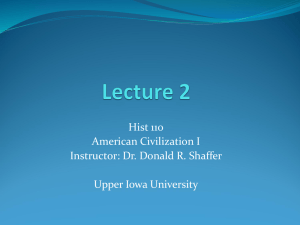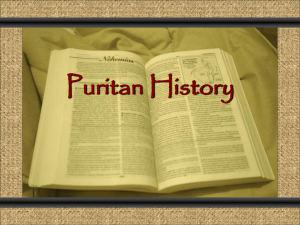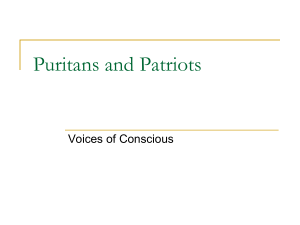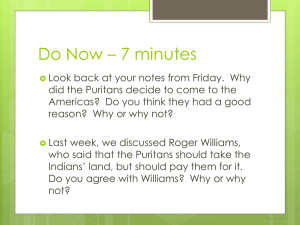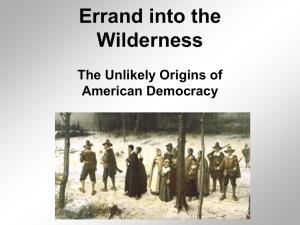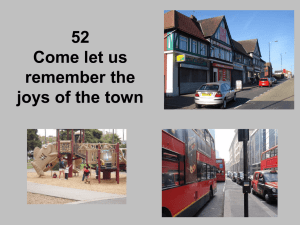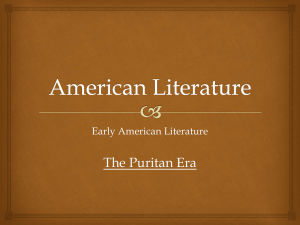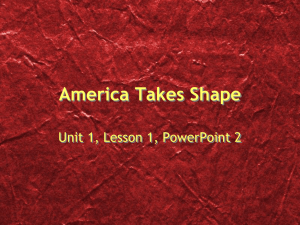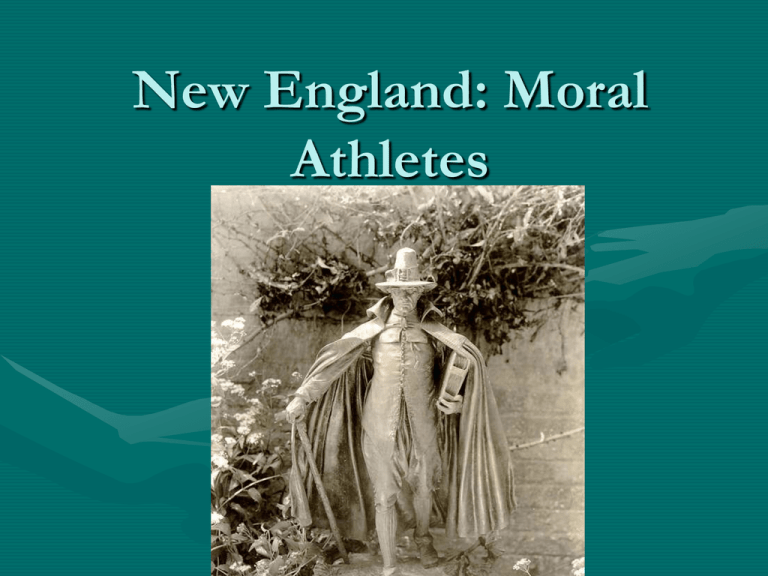
New England: Moral
Athletes
• (’74) Puritanism bore within itself the seeds of its own
destruction. Apply this generalization.
• (’83) In the seventeenth century, New England Puritans
tried to create a model society. What were their
aspirations, and to what extent were those aspirations
fulfilled during the seventeenth century?
• (’81) To what extent and why did religious toleration
increase in the American colonies during the
seventeenth and eighteenth centuries? Answer with
reference to three individuals, events, or movements in
American religion during the seventeenth and
eighteenth centuries.
• (’98) Analyze the extent to which religious freedom
existed in the British North American colonies prior to
1700.
I. The Rise of Puritanism
A. True Christians
• Although Henry VIII broke w/Catholics over
divorce and remarriage (Anne Bolyn, etc.) and
formed Church of England (Anglican
Church), kept ceremonies of Catholicism
• Elizabeth I balanced tradition with
Reformation unifies people around moderate
Protestantism
• “True Christians” (Puritans by enemies):
extreme Protestants who considered C of E too
Catholic
• Calvinists: believe in predestination: fate
(damned or elect/saint) already determined by
God, cannot change His mind through good
works (unlike Catholics, Arminians, Methodists)
B. Moral Athletes
• Terrible burden: am I elect?
• Sanctification: ease anxiety by acting as if one of the
elect “moral athletes”
• Calvinism a source of spiritual activity not passivity
C. Puritanical Puritans?
• Social critic H.L. Mencken: “haunting fear that
someone, somewhere is happy”
• Puritans believed things of the world created by
God in order to be enjoyed: sin lies in the abuse
of worldly things
– Enjoy alcohol, condemn drunkards
– Enjoy sex, condemn adultery
II. “A Citie on a Hill”: The Puritan
Social Vision
A. The End is Near
• Took more than spiritual anxiety to
found colony, took a social vision
• Believed Old England in imminent
danger of God’s wrath (Old
Testament-style smiting)
• England had failed to keep the
national covenant: agreement w/God:
if kept prosperity and peace; if
broken death and destruction
“World of Wonders”
• David Hall
• God acts in this world
– Lightning, earthquakes, birth defects, etc.
• Theodicy
– 9/11 (Jerry Falwell); Katrina
B. “A Model of Christian Charity”
• March 1630: Fleet leaves England
under joint stock Massachusetts
Bay Company (more important
than Plymouth and Pilgrims)
• Aboard the ship Arabella, John
Winthrop gives a lay sermon—“A
Model of Christian Charity”—laying
out the Puritan social vision for the
“New Jerusalem” in America
(Doc A)
• Puritans would keep the
covenant with God, would
prosper, would set example for
the world
• Last, best hope for mankind
(falling under power of antiChrist Pope)
• “Christian Charity”: love in action
• “City”: Christian living is communal living:
fallen live for themselves, elect live for Christian
love
• Socialist vision: excess profits should be
given up to support those in need
– Wage and price controls (Doc E)
III. New England Town Life and
Christian Watchfulness
A. Transplanted Towns
• Winthrop’s sermon a literal statement of how
colony should be formation of towns
• Emigrants (often entire congregations) would
request land grant from General Court in order to
establish a town (unlike headright system in VA)
– Sometimes entire towns would pick up and move
together to New England (and keep their hometowns
name: Plymouth Plymouth; New London, etc.)
– (Doc B + D)
• First structure was the meetinghouse (even
before planted fields)
• Towns physically tight knit
Meetinghouse
• Practiced diversified
farming on the English
model: wheat, rye, maize
• Towns an extended kinship
network: people knew each
other’s business
– Primary sources, esp. adultery
cases, reveal how much
neighbors knew; gossip
rampant
– The Onion
B. Christian Watchfulness
• Seen as positive value: Christian Watchfulness
• Puritans had not only the right but the
obligation to watch over each other and
admonish wrong action
– Those who did not inform on criminals would be
charged as accessories
• Certain officials (constables, night watchmen,
tithing men—supervised 10 families)
elected/appointed to watch, could enter any
home they wished
Why?
• Social covenant: all must live w/in God’s law or all
punished
– Used to explain warfare with Indians (esp. King Philip’s
War), deformed births, bad harvests, etc.
Shows: 1) did not literally establish social utopia but 2) did
represent attempt + established means to control sin
(Doc E)
1662: Half-Way Covenant: non-baptized, non-converted
could partake of partial services (no communion, no
voting)
Arminianism: covenant of works (Salem Town); 1686
Dominion of New England; 1689 Act of Toleration
C. King Philip’s War
• King Philip’s War (1675-76):
under pressure from colonial land
expansion, Indian population
decline, a falling away from Indian
traditions (John Eliot’s Praying
Indians) Indian leader
Metacomet (King Philip) leads
pan-Indian movement against
English
– Jill Lepore: caused by fear of Middle
Ground cultural loss on both sides
• Attack over 1/2 all Massachusetts
towns, destroyed 13
• Disease, food shortage, inter-tribal division,
Metacomet’s death collapse Indian resistance
• 10% Mass. men capture/killed (in proportion to
population, most costly war in all of American
history)
• Almost entire generation of Indians killed
• Outcomes: 1) destroyed Indian resistance to
expansion, 2) racialization of Indians:
conversion no longer made Indians equals (1/3
Praying Indians joined Philip; many sold into
slavery in Mass or Caribbean), 3) strengthens
Puritan declension narrative (falling away) and
jeremiads (righteous prophecy of doom)
– Perry Miller: jeremiads evidence of NOT falling
away
IV. Little Commonwealths: Puritan
Family Life
• Families were the single most important social
institution in New England (as opposed to
indenture)
• Puritans migrated largely as families and
communities (VA as individual men)
• “Little
Commonwealth”: little
state in and of itself, the
basis for the social order
• Key to order:
subordination to family
authority: wife to
husband, children to
parents, servants to
masters
– “Hiving out”
• Family ties grew stronger in NE than OE
• NE mortality rates low, sex ratio more equal
(still more men than women), marriage
universal, divorce infrequent, more children
V. English Cultural Persistence: New
England vs. Chesapeake
• History of early VA: social disorder + cultural
disintegration
• History of early NE: social order + cultural
persistence
Chesapeake
New England
Emigrate as individuals,
dispersed plantations,
slipshod houses, slow to
form families
Emigrate as
families/communities,
settled towns, fine homes
New cash crop +
agricultural system (market
based plantation ag.)
Primarily traditional English
crops and practices (crop
rotation)
Individualistic
Communal
• New Englanders were establishing a more
traditional society than England itself
• Virginians were trying to remake themselves, to
rise up the social ladder (although the hierarchy
they created would resemble that in England)
Where did America begin, New England or
Virginia?
Theoretical Overviews of American
History
• Progressives (Charles Beard) vs. Consensus
School (Richard Hofstadter)
• Germ theory vs. American exceptionalism
– Classical Republicanism (Gordon Wood) vs.
Frontier thesis (Frederick Jackson Turner) vs.
Slavery (Edmund Morgan)
• Frontier thesis vs. Middle Ground/Borderlands
(Richard White/Patricia Limerick)
• Marxists vs. Intellectual historians vs. Social
historians vs. Microhistorians vs. Feminists

